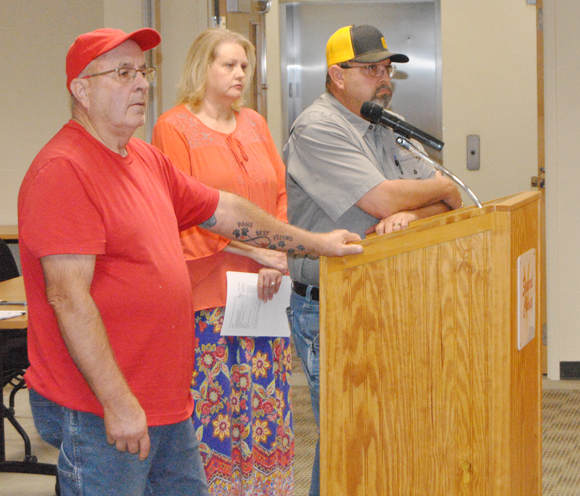ROBERT PIERCE
• Leader & Times
Before Tuesday’s public hearing to hear from constituents about the intent to exceed the Revenue Neutral Rate for the upcoming fiscal year, Seward County Administrator April Warden explained the RNR to taxpayers and how the hearing process works.
“The Revenue Neutral Rate is the tax rate in mills that would generate the same property tax revenue in dollars as levied in the previous year using the current tax year’s total assessed valuation,” she said. “During the 2021 legislative session, the tax lid was removed, and the legislature enacted Senate Bill 13 and House Bill 2104.”
This legislation, Warden said, established new notice in public hearing requirements if the proposed budget would exceed the RNR.
“The Revenue Neutral Rate is about the mill levy and not tax dollars,” she said. “The mill levy needed to fund the budget as proposed in 2025 is 51.399 mills. The estimated valuation is $266,612,714.”
Warden said final certification of the budget will not be done until the November abstract, and the county simply works off July estimates for each year.
“Due to outstanding appeals before the Board of Tax Appeals, valuation can change,” she said. “As of now with the estimated valuation, one mill equals $266,613. The county is proposing to exceed the Revenue Neutral Rate.”
Warden said there is a process the county followed to exceed the RNR.
“We did notify the clerk by the July 20 deadline of our intent to levy above the Revenue Neutral Rate,” she said. “The hearing must take place between Aug. 20 and Sept. 20. That’s why we are having this evening. Publication of said hearing must be done 10 days prior to the budget hearing, which has been done.”
Warden said the county commission would need to pass a resolution in order to exceed the RNR.
“It does require the record of roll call of the vote and then formally adopting the budget,” she said. “Between Aug. 30 and Oct. 1, the commission will have to certify the budget to the county clerk’s office. We have prepared resolutions for Seward County as well as the Seward County Rural Fire District to exceed the Revenue Neutral Rate.”
Warden said hearing allowed the public an opportunity to speak without unreasonable restrictions.
“Between Aug. 20 and Sept. 20, taxing subdivisions are required to have a Revenue Neutral Rate hearing,” she said. “The taxing subdivision is required to publish the hearing details in the newspaper and on our Web site 10 days prior to the hearing date.”
The RNR for Seward County for Fiscal Year 2025 is 43.414, with the Rural Fire District’s rate set for 7.960 under the proposed budget. Warden said the budget conveys the county’s direction, priorities and commitments of community resources.
“We have to evaluate our current services, recognize the needs citizens are identifying and balance those needs against the tax and revenue required to finance them,” she said. “The budget guides and plans what the Board of County Commissioners is being asked to accomplish, along with the human capital and financial means to do so. Circumstances change. There can be shifts in priorities, changes in the financial environment and unforeseen events.”
Warden said the county’s valuation has remained stagnant in recent years and is currently at the rate it was in 2006. She added the county has budgeted for years by mill levy instead of by need.
“No one sets out to want to increase taxes,” she said. “By doing this, we’ve squeezed the budgets to the bare minimum for many years, and due to this, we have aging equipment and infrastructure and inflationary challenges each household is facing are on a much larger scale, so there comes a point in time when you’re looking at an increase in the mill levy. We do have to consider unfunded mandates, inflation, return on our investments, fee structures, insurance premiums, infrastructure, equipment and other capital expenditures.”
Warden said the purpose of the budget is more than filling out forms to comply with a state law, and there is much more to determine what the property tax level should be.
“It is a huge process and one of the most important responsibilities of you as commissioners,” she said. “There is a cost of doing business and providing those services that keep our county going.”








